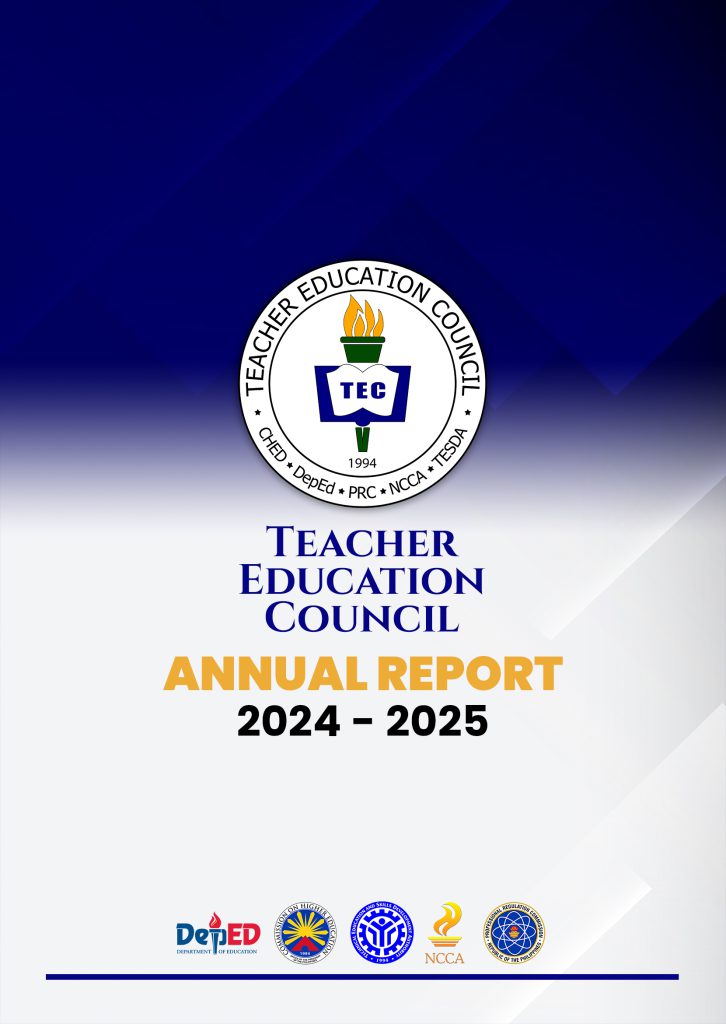
The Teacher Education Council (TEC) celebrates its 31st anniversary—August 4, 2025—with its first Annual Report since the passage of Republic Act 11713. More than a record of accomplishments, the report serves as a forward-looking, national call for reform to elevate the Filipino educators.
According to a collective statement from the Council members, “At the heart of every classroom, every learner’s dream, and every community’s hope is a teacher—supported, empowered, prepared, and recognized. It is an understatement to say that our teachers are the heroes of our nation—everyday, they broaden the horizon of what is possible for our learners, they stand tall and face the challenges experienced by our communities, and they continue to uphold truth and pursue a more just nation through education.”
From 1994 to present
The first Congressional Commission on Education identified multiple challenges that contributed to what it described as an “apparent deterioration of Philippine education” in 1991. TEC’s inception in 1994, through RA 7784, was a response to a fragmented teacher education system. Three decades later, findings from the Second Congressional Commission on Education in 2023 revealed that while some “institutional reforms proposed to improve teacher quality were implemented…the desired changes were generally unobserved.” Persistent challenges, such as dismal licensure exam performance, limited content mastery, overwhelming administrative loads, and misaligned professional development opportunities, continue to burden the sector.
Recognizing the need for a more transformative change, the Philippine government enacted RA 11713 in 2022 ahead of these findings. This landmark legislation significantly expanded TEC’s powers and functions to establish a more coherent, responsive, and future-oriented teacher education system.
The Council—composed of DepEd, CHED, TESDA, NCCA and PRC—is collectively mandated to do policy development and quality assurance in teacher education, strengthen coordination and collaboration with agencies, and develop research and innovation for teacher quality.
The strengthened TEC, assisted by the new Secretariat since 2024, has taken decisive steps to assess the current landscape of teacher education and respond with strategic and systemic solutions to education challenges.
At the top of the Council’s list of interventions are reframing the outdated pre-service curriculum, addressing systemic gaps in Center of Excellence (COE) identification, aligning licensure examinations with current programs, and confronting teacher shortage and specialization mismatches.
A highlight of TEC’s quick wins and bold commitments:
- Pre-service education curriculum reframing: The comprehensive reframing initiative was launched to align the pre-service teacher curriculum with national priorities and global benchmarks. The reframing aimed to strengthen real-world practice for aspiring teachers, bring back the teaching of foundational skills, integrate specializations in certain key stages, and allow for flexibility in programs and program delivery in teacher education institutions (TEIs).
- National profiling studies: TEC has continued profiling 1,570 TEIs to date. This study, started by EDCOM II and the Research Institute for Teacher Quality (RITQ), along with other profiling studies, is intended for the Council, policymakers, and stakeholders to make data-driven decisions and inform policy and program development for educators.
- COE governance reforms: With constant alignment with CHED, TEC designated 35 Teacher Education COEs, effective until November 2025, and started developing a new policy to ensure regional equity, transparency, performance-based selection, and support for continued excellence.
- Specialized licensure examinations: Together with CHED and PRC, TEC formalized the plan to implement differentiated licensure exams aligned with specialization tracks starting 2025. Working towards a long-term solution in improving teacher licensing, TEC continues to lobby for amending the Philippine Teachers Professionalization Act of 1994.
- Institutional strengthening: Now with increased operational capacity and strategic reach, TEC Secretariat was significantly expanded from 4 to 51 plantilla positions with the Department of Budget and Management’s (DBM) approval and the Presidential appointment of third-level directors.
- Research and data initiatives: With 12 TEIs as research partners, the Php 74 million Research Initiatives in Teacher Education (RITE) Project marked a significant investment in evidence-based policy and innovation for teacher development.
A way forward
The Council recognizes that the work is far from over, but the progress of the past year gives reason for optimism for ongoing and future endeavors. A clear roadmap for teacher education, combined with greater synergy among member agencies and stakeholders, will guide the reform forward.


